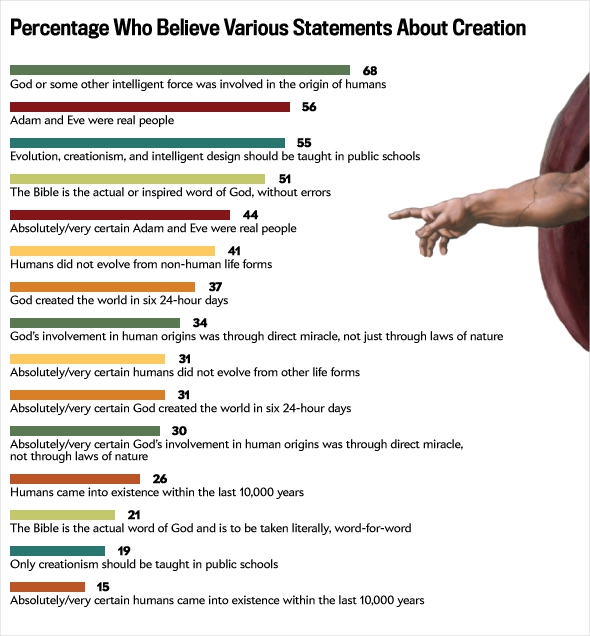
Supernaturals are Superfluous
Descriptions and explanations do not need actual supernaturals to make sense out of what we observe, feel, think, do or say. This is a rational reason for not believing that angels, demons, faeries, ghosts, gods, vampires, werewolves, witches, or zombies exist. Doing philosophy (logic, epistemology, metaphysics, ethics) demonstrates this. Have you got a proof that shows that God is necessary? Well, if it is possible that God does not exist, then Norman Malcolm (1960) has an ontological argument which also can show that God is not necessary.
What makes this a crazy idea is that most people believe in supernaturals (The Harris Poll, 2013). Supernaturals are non-physical, non-mental, non-sensible agents that are unconstrained by spacetime or natural laws. Angels visit, ghosts haunt, devils make us sin, gods make and destroy worlds.
We should take this view more seriously because it blinds us to fundamental incompatibilities between religion and science. They disagree about the necessity of a divine creator: Either an intelligent creator must exist, given evidence, or it is not the case that one must exist, given the same evidence. They disagree about how best to explain, say, amazing diversity and complexity in nature. Theists think one cannot explain it without the god of Abraham, Isaac, and Jacob, but cosmology and evolutionary theory show how one can. Each worldview cultivates contrary attitudes about common-sense, traditional beliefs, and novel assertions. Accept claims based on faith, regardless of evidence, or, believe only those claims grounded in testable evidence. Supernaturals, not being amenable to investigation, could be imaginary and we would not notice any difference. A few scientists, such as biologist Richard Dawkins and physicist Lawrence Krauss, go so far as to say that belief in God is a harmful delusion.
As an ethnic Catholic apostate, my biased impression is that the sort of basic religious person with which I am familiar accepts the following proposition, call it the God Hypothesis: “The most accurate story about the amazing complexity & diversity of the natural world includes a divine creator who has an essential, causal role.” I might be wrong, but something like this is what most religious people believe. It expresses an ontological commitment to a divine creator, whom I take to be in the set of possible supernaturals. Am I wrong? Even so, that a divine creator (God) is possible is not sufficient reason to believe it is actual.
Pope Francis, for instance, accepts and teaches the God Hypothesis. He had this to say in a recent 2014 speech at the Pontifical Academy of Sciences: "When we read about Creation in Genesis, we run the risk of imagining God was a magician, with a magic wand able to do everything. But that is not so. He created human beings and let them develop according to the internal laws that he gave to each one so they would reach their fulfilment. The Big Bang, which today we hold to be the origin of the world, does not contradict the intervention of the divine creator but, rather, requires it. Evolution in nature is not inconsistent with the notion of creation, because evolution requires the creation of beings that evolve." Most scientists think this is backwards, but of course they are not as sure as the Pope and his followers are. Religious people value and cultivate faith, scientists value and cultivate doubt. Science and religion are not opposites, but doubt and faith are.
Most scientists do not accept the God Hypothesis. Scientists don’t accept this hypothesis, because their descriptions, explanations, predictions neither require it nor imply it. They don’t need to deny it or call it impossible in order not to accept it. I say this because they say that they think this when asked directly. But few are sure and of course they might be wrong. They just don’t have that ontological commitment, or, few of them find any serious omission in any theory that does not assume the god hypothesis. Scientists think supernaturals are possible but superfluous or at least uninvestigable so why bother. I think this is fair to say. One does not have to show that supernaturals are impossible to believe that they are not necessary.
It remains an open question whether any supernatural is metaphysically necessary. People disagree about whether at least one sort of supernatural is necessary: R presumes one is necessary and theorizes accordingly. S just does not presume it and theorizes without it. This looks like a trivial sociological point, but it isn’t. Again, either God is essential to the true story of the cosmos or God is not. These two ontological positions in play are not compatible: “No natural process without God could produce the cosmos,” vs. “Some natural process without God could produce the cosmos.” If you are a scientist and a Christian, then you choose a side, and many do. Sure, science has no special authority over this metaphysical issue, but neither does religion. Religion and science neither occupy exclusive territories nor should they. A scientist can accept that at least one supernatural exists, sure, but a religious person cannot accept that no supernaturals (or no gods) exist.

Scott Merlino, PhD
Department of Philosophy
Sacramento State